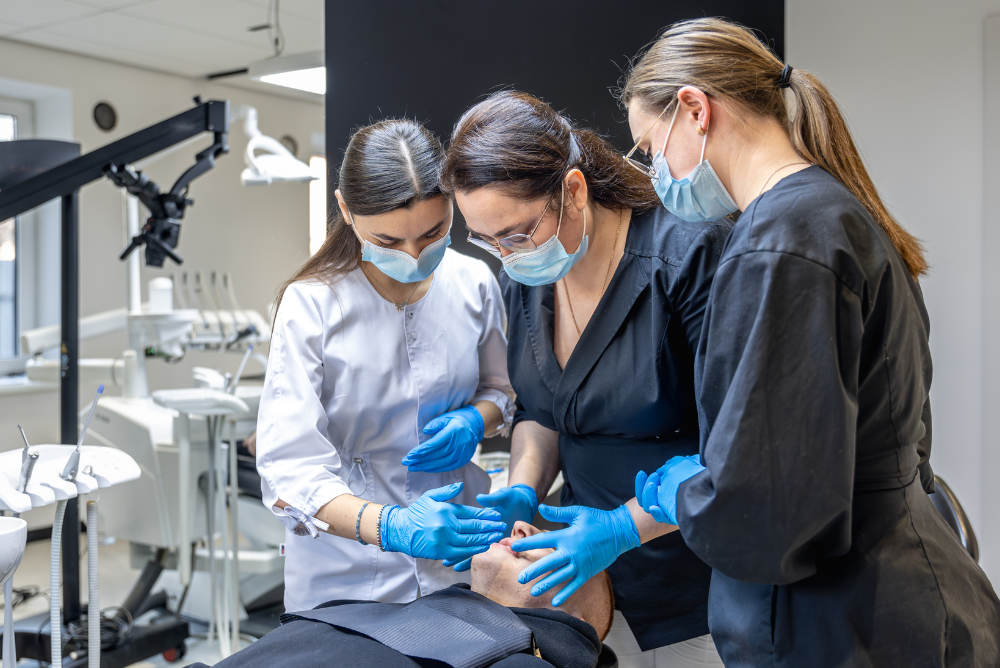Top 5 Oral Surgical Procedures in Redwood City and When They Are Needed

When do you think oral surgery is needed as opposed to dental care? Some dental problems require more than just a cleaning and filling. Oral surgical procedures in Redwood City are necessary for deeper issues like impacted teeth, jaw alignment, or bone loss. If your dentist proposes one, being familiar with these processes may provide you with confidence.
1. Tooth Extractions—When a Tooth Can’t Be Saved
The tooth extraction is one of the most common oral surgical procedures near you. Crown restorations are required when a tooth is too damaged to be repaired because of decay. Sometimes wisdom teeth don’t grow in correctly or cause crowding. We may recommend removal.
Signs you might need an extraction:
- Persistent pain or swelling.
- Impacted wisdom teeth.
- Severe decay or gum infection.
2. Dental Implants—Replacing Missing Teeth
Dental implants are a permanent tooth replacement that looks and feels natural if you’ve lost a tooth. It places a titanium post in your jawbone that functions as a tooth root. A dentist in Redwood City may recommend implants for single or multiple missing teeth.
Why implants are beneficial:
- Prevent bone loss
- Maintain facial structure
- Provide long-term durability
3. Bone Grafting—Strengthening the Jaw for Future Treatment
Bone grafting can help restore your bone after losing it due to injury, infection, or illness. Often, this procedure is performed before placing the implants to make sure the jaw is suitable for supporting dental implants. A dental office in Redwood City can check if you need bone grafting with the help of X-rays and scans.
You may need bone grafting if;
- You’ve had missing teeth for years.
- You’ve suffered jawbone thinning.
- You want dental implants but lack sufficient bone.
4. Gum Surgery—Restoring Gum Health and Smile Appearance
When gum disease becomes advanced, regular cleanings can’t remove all the bacteria underneath the gums. Gum or periodontal surgery provides the cleaning of deep pockets and restores health. The gums can also be reshaped for a better smile. A dentist near you can determine whether you need this treatment to prevent any tooth loss.
Benefits include.
- Reduced bleeding and swelling.
- Improved gum-to-tooth attachment.
- Healthier and more balanced smile.
5. Corrective Jaw Surgery—Fixing Bite and Alignment Issues
A misaligned jaw can result in pain, difficulty in chewing, and even breathing issues. The problem will be solved by corrective jaw surgery, which will reshape the jaw to the right working order. This is a specialist intervention, which is usually a last resort; an oral surgeon will be the one to make this kind of recommendation. If you were to face such a situation.
- Jaw pain or difficulty chewing.
- Chronic bite problems.
- Facial imbalance due to jaw misalignment.
Why Oral Surgery Is Important for Long-Term Health
These treatments aim at both the present conditions and the future ones that may be caused by infections, tooth shifting, and bone deterioration, among others. Hence, detecting the problem in its earliest stage and having the surgery done in time can be a great dental complication prevention strategy.
Ready to Restore Your Smile?
Maybe you need oral surgery from a dental office near you? In that case, go to the Peninsula Dental Implant Center. Our staff provides you with pain-free, state-of-the-art treatment to help you become comfortable and confident again. Don’t wait any longer; give us a call today to start your journey to a healthier and more beautiful smile!
FAQs
When is it necessary to see a dentist for oral surgery?
If you experience extreme pain, swelling, or have missing teeth that need to be replaced, then go see a dentist.
Can oral surgical procedures be painful?
They are silent with the use of anesthesia, and any slight discomfort after can be relieved without difficulty.
What is the duration of the postoperative period after oral surgery?
The majority of patients recover within several days to two weeks if they take good care of themselves.
Can I eat normally after oral surgery?
Stick to soft foods for a few days and avoid hard or spicy items.
Back to Blog Page



